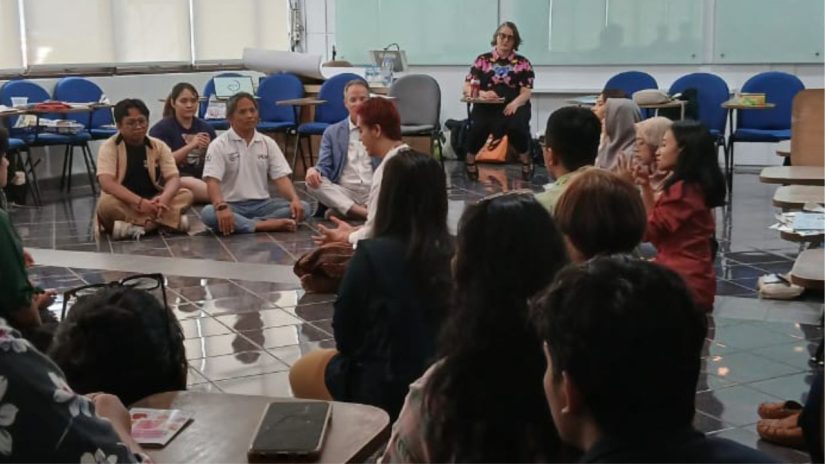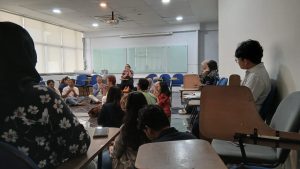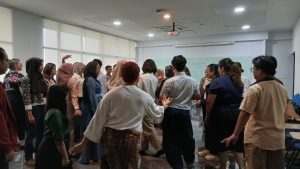
Yogyakarta, September 19th, 2025 – The Master’s Program in Performing Arts and Visual Arts Studies (PSPSR) at Universitas Gadjah Mada, in collaboration with Prof. Scott Thurston and Dr. Joanna Omylinska-Thurston from the University of Salford, held the “Interlude Space: Expressive Arts for Well-Being” workshop. This event was part of the Arts for the Blues parallel session, an initiative focused on utilizing art as a medium for self-reflection and healing.
The workshop was a collaboration between Teman Ketjil, a program initiated by PSPSR UGM students (Dharajatya Tri Paramatatwai, Namira Azzahra, and Yohanna Simanjutak), and two facilitators from the University of Salford: Prof. Scott Thurston and Dr. Joanna Omylinska-Thurston.
Art as a Medium for Emotional Expression and Healing
The session began with introductions and a shared agreement on safety, boundaries, and confidentiality. Participants were then guided to perform a “grounding” exercise through breathing and a body scan to harmonize their minds and bodies. They were given the freedom to find the most comfortable position, whether seated on a chair or on the floor. This intimate atmosphere encouraged participants to be grateful and to offer positive affirmations to themselves.
The session continued with a “walking” activity, where participants took a short walk to become aware of their body’s rhythm and movements. This exercise demonstrated that every individual has a unique emotional rhythm and pace.
The core of the workshop, titled “In the Garden,” invited participants to integrate drawing, collage, writing, and poetry. Participants were asked to imagine and create an ideal garden, which served as a metaphor for a safe space within themselves.In this session, participants not only engaged in creative activities but also in deep reflection. They wrote about their feelings and the needs of that personal space, even using their non-dominant hand to access an emotional side that is often difficult to express with words. Keywords from their writing were then transformed into poetry, a process that connected personal experience with artistic expression.
“Interlude Space” proved that the practice of expressive arts can bridge the gap between thoughts and feelings. By using non-verbal mediums such as drawing and body movements, participants could express experiences that might be too difficult to articulate verbally, opening the door to self-understanding and emotional recovery. The workshop not only brought together the practices of art and psychotherapy but also created an interdisciplinary space that is relevant to the mental health needs of modern society.
Sustainable Development Goals (SDGs)
This event directly contributed to the achievement of several Sustainable Development Goals (SDGs), including:
- SDG 3: Good Health and Well-Being: By focusing on mental health and emotional well-being, the workshop provided a safe space for participants to manage stress and increase self-awareness.
- SDG 4: Quality Education: The workshop offered an innovative learning model that goes beyond conventional methods. Participants were invited to learn through direct, experiential learning that integrates art, psychotherapy, and personal development.
- SDG 17: Partnerships for the Goals: The collaboration between PSPSR UGM and the University of Salford is a concrete example of an effective global partnership. The two institutions worked together to share knowledge and best practices in supporting mental health through art.
The “Interlude Space” workshop demonstrates that art plays a vital role in supporting mental and emotional well-being, aligning with the global agenda to create healthier and more empowered communities. (IP)







